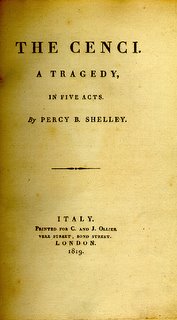
The Cenci. Percy Bysshe Shelley
Shelley's The Cenci is just one of many tellings of a true story that captures the imagination and the heart of almost everybody who hears of it. The story has been retold in many novels, even in opera.
It is the tale of the lovely and innocent Beatrice Cenci, who in late 16th century Rome was molested by a corrupt and powerful father, Count Francesco Cenci. Her father was so well-connected that there was no one, not even the Pope, to whom she could turn for protection. So, with the help of her mother and her brother, she seeks the ultimate revenge and pays the price.
Shelley's poetic drama is considered one of the best works of his short life. His treatment is more Shakespearean than poetic, but without the immortal bard's light comic touches. The Cenci is true tragedy through and through with a poetic touch that will capture the soul of the reader. I found myself reading passages aloud to myself to both hear the dramatic content and to better understand the meaning of dialogs broken into lines of poetry. This is not an easy book to read, both for its subject and its writing style, yet the reward is well worth the effort. Some of Shelley's greatest lines are in this work. Here is a brief segment from the 5th Act of Beatrice's words in contemplating her fate:
Oh, trample out that thought! Worse than Despair,
Worse than the bitterness of death, is hope;
It is the only ill which can find place
Upon the giddy, sharp and narrow hour
Tottering beneath us. Plead with the swift frost
That it should spare the eldest flower of spring;
Plead with awakening earthquake, o'er whose couch
Even now a city stands, strong, fair, and free;
Now stench and blackness yawn, like death. Oh, plead
with famine, or wind-walking Pestilence,
Blind lightning, or the deaf sea, not with man!
Cruel, cold, formal man; righteous in words,
In deeds a Cain.
No comments:
Post a Comment